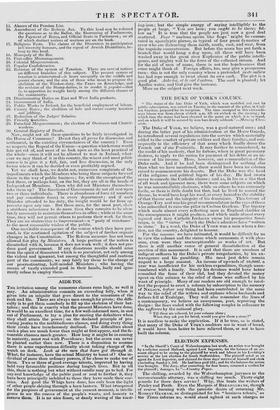THE DUKE OF 'YORK'S COLUMN.
" The statue of the late Duke of York, which was modelled and cast by
public subscription, was raised on Tuesday to the summit of the pillar, in Carl- ton Gardens, prepared for its reception. The time occupied in this extraordi-
nary labour was from eleven o'clock a.m. till six o'clock in the evening ; by which time the statue had been elevated to the point on which it is to stand, and on which it will be secured by iron bars firmly soldered."—Murniny Chro- nicle.
The Duke of YORK, we believe, was a good-natured man ; and during the latter part of his administration at the Horse Guards,
he introduced several regulations into the service which materially added to the comfort of private soldiers and their families, and con- sequeetly to the efficiency of that army which finally drove the French out of the Peninsula. It-may further be remembered, to the credit of his modesty, that be forbore, when in great pecuniary distress, to apply to the nation for payment of his debts or an in- crease of his income. Here, however, our commendation of the Duke ends. And if be had been distinguised for nothing else than what we have mentioned, there would have been no column raised to commemorate his deserts. But the Duke was the head
of the religious and political bigots of his day. He had sworn never to concede the Catholic claims ; and as, in his ca e like that
of all weak and ignorant men, there were some subjects on which he was uncontrollably obstinate, while on others he was extremely facile, so there is little doubt but that, had be lived to ascend the throne, he would have kept his word, at every hazard to time stability
of that throne and the integrity of his dominions. This fervour of Orange-Tory zeal was his great recommendation in time eyes of those
who subscribed to raise the pillar in Carlton Gardens. The bigotry which made almost every reflecting man in England shudder at the consequences it might produce, and which made almost every
injured and fiery Catholic Irishman curse his prospective Sove- reign, is the " virtue " which the Duke's admirers have "written in stone." In a word, the Duke of YORK was a man whom a fac- tion, not the country, delighted to honour.
For the reasons we have intimated, it would be difficult for us to view the column and the statue which surmounts it with plea- sure, even were they unexceptionable as works of art. But
there is still another cause of general dissatisfaction at the erection of this monument. It is said that there are numbers of
indigent sufferers by the Duke's private irregularities, by his ex- travagance and his gambling. His most just debts remain unpaid to a large amount. An income of upwards of 40,000/. a year was insufficient for his reckless expenditure, though unen- cumbered with a family. Surely his devotees would have better consulted the fame of their idol, had they devoted the money
spent on this column to the relief of those who suffered by his want of principle. Many of our readers are old enough to recol- lect the proposal to erect a column by subscription to the memory of NELSON, before any thing had been contributed in the same way to the relief of the widows and orphans whose husbands and fathers fell at Trafalgar. They will also remember the lines of a contemporary, we believe an anonymous, poet, reproving the design : the lines ended with the following couplet in reference to the sufferers by the national glory.
" Till these are relieved, let your column alone; 'When they ask you fur bread, would you give them a stone?"
It is needless to make the application. If it be true, as is stated, that many of the Duke of Yortx's creditors are in want of bread, it would have been better to have relieved them, or not to have built the column.




















 Previous page
Previous page